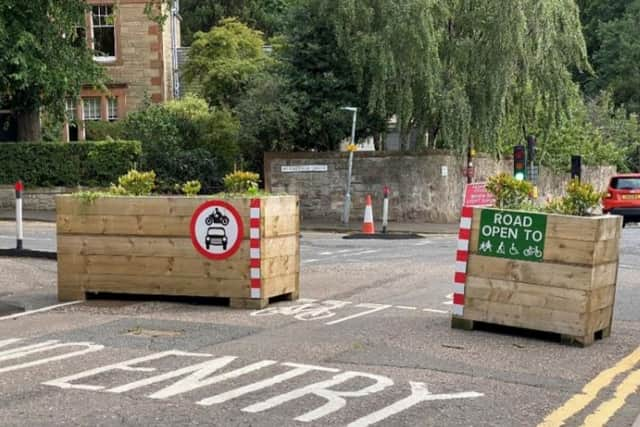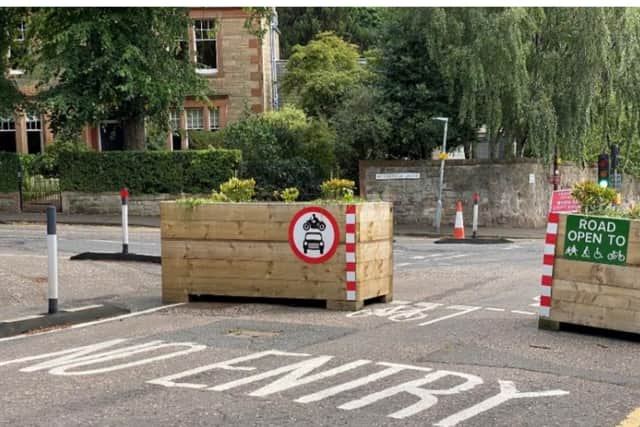Edinburgh traffic: Planters in Morningside's Braid estate to go despite pleas over safety


Roads in Morningside's Braid estate are to be reopened to traffic despite pleas from campaigners who claimed safety would be put at risk.
Edinburgh's transport committee agreed to remove traffic filters - typically planters - from one of the city's most controversial Spaces for People schemes, part of the Greenbank to Meadows Quiet Route, and install a segregated cycle lane after the move emerged as the favoured option of residents in a survey.
Advertisement
Hide AdAdvertisement
Hide AdA deputation from Blackford Safe Routes said filters were the "only sensible option for residential streets" and could reduce the risk of death and serious injury by 50 per cent.


The group said removal of the filters would result in the loss of a safe east-west route for pupils walking and cycling to South Morningside Primary School. "Voting to remove modal filters, which are the safest option, is knowingly putting the interests of motorists ahead of children's right to life. We sincerely hope no more children will die on Edinburgh’s roads while councillors play political games." Another deputation, representing Residents of Braid Avenue, said before the Quiet Route, Braid Avenue was "a no-go area for wheeling, walking and cycling". "It is an absolute joy now to be part of the Quiet Route. Benefits include traffic reduction of 40 per cent."
And Morningside Green councillor Ben Parker said he was angry the decision to remove the filters would happen on the same day as the the committee had united in support of an emergency motion about the death of a child cyclist. He said: "Please don't let the sympathies you expressed earlier turn out to be hollow promises when faced with what should be a very simple decision about the continuation of the Quiet Route in my ward which provides so many benefits and addresses the very real safety concerns of children and young people of South Edinburgh."
Transport convener Scott Arthur, backing the removal of filters from the Braid estate and the new segregated cycle lane, said it was a difficult issue because of the competing demands.
Advertisement
Hide AdAdvertisement
Hide AdHe said in view of the history of the scheme and people's feeling they had not been listened to previously, that the option was the right one since it had been supported by around 50 per cent of people.
But he said: "I'll make a prediction - if we do go for this option, people in the Braid estate, many of whom support this option, are going to be contacting us, possibly asking for some of these filters to come back. And as a committee, given the nature of this debate, I think we have to be open to those requests."
SNP transport spokesman Danny Aston argued for keeping the filters. "We cannot support the removal of filters and other measures from the Braid estate which have made it safer for pedestrians. No matter how good a segregated cycle lane is, that will not improve the safety of pedestrians. In particular, I;m thinking about school kids who are walking to school.
"The report is very clear that the measures have sharply reduced speeds and also sharply reduced through traffic in the Braid estate by 40 per cent with no commensurate increase in traffic levels on Comiston Road and Morningside Road. It is an absolutely outstanding example of traffic evaporation and one we need to be replicating around the city, not ripping out."
Advertisement
Hide AdAdvertisement
Hide AdLib Dem Morningside councillor Neil Ross said residents were rightly frustrated by the way the scheme had been handled by the council since it was imposed on them without consultation during Covid. He said: "That wouldn't matter so much if the scheme worked well, but it doesn't. There are too many safety concerns for cyclists around filters and at junctions. And previously quiet streets in the area have been turned into rat runs."
Tory transport spokeswoman Marie-Clair Munro said residents in the Braid estate had been asked to take part in numerous consultations and many were suffering from consultation fatigue. She said: "This is not about the residents of the Braid estate shouting the loudest, it's about residents who want their voices heard regardless of their preferred option and this has not happened in the past. We must ever lose sight of the fact that the residents of our city, at the end of the day, are our employers - we have a duty to listen to them and, regardless of what we fell, when we ask them what they want we have to deliver it."
Comment Guidelines
National World encourages reader discussion on our stories. User feedback, insights and back-and-forth exchanges add a rich layer of context to reporting. Please review our Community Guidelines before commenting.